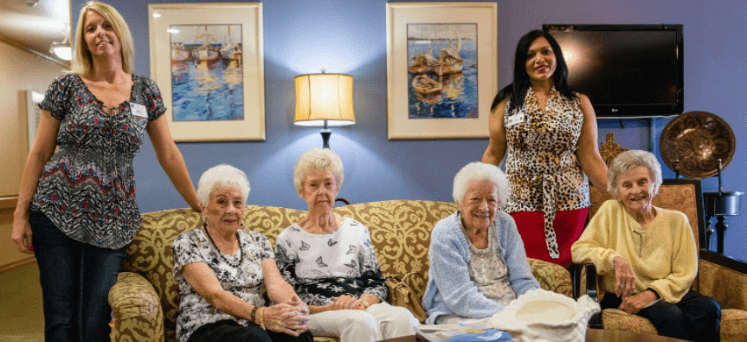
This blog was published on February 4, 2016 and updated on January 9, 2020.
Assisted living is the ideal retirement strategy for many seniors. These supportive communities can preserve seniors’ independence by offering them the help they need in a safe setting. For seniors who live alone or no longer drive, the rich variety of activities in assisted living can offer a new lease on life, with infinite possibilities for new friendships, new hobbies, and getting (or staying) active. Many seniors are happier in senior living, and some report that the transition to senior living is the best decision they ever made.
Some families wait to begin their search until a senior has an urgent need. Perhaps they’ve stopped driving or recently suffered a fall. Although the reluctance to dive headfirst into unfamiliar waters is certainly understandable, delaying the search for senior living can make the transition more difficult. Instead, consider exploring your options before you or your loved one needs more care. This can ease the fear and uncertainty associated with growing older, because you’ll already have a great community in mind when the time comes.
The more questions you ask, the better. Every senior has their own needs and values, so spend some time thinking about what your ideal living situation looks like. Then begin the investigation. These senior living questions can help you find a community where you or your loved one can thrive.
Do you have apartments available now?
This may seem like a silly question to ask, but assisted living communities can sometimes feature a waitlist for apartment openings. If they have a waitlist, ask how long you can expect to wait, and whether other factors might affect the wait. For example, you may wait longer for a private room, and some assisted living communities offer only a limited number of beds for people on Medicaid. Do you need care now, or can you wait for your first-choice community to have an opening?
What types of apartments do you currently have available?
The community must offer apartments that are a good match for your needs and budget. How much space do you want? Consider other needs, as well. For example, some people want a large space to prepare meals. No apartment model is necessarily better than another, but it is important to match your apartment to your needs.
What services does my monthly fee include?
Stay informed about your costs and what services are covered in the monthly fee. You may find that your Internet, cable, and utilities are covered in the monthly rent, but ask about additional services you may have to fund. For example, weekly housekeeping services might not be covered in your rent. You may also have to purchase a meal plan for a certain number of meals per day. Although some communities offer comprehensive bundles of services and amenities, others are more à la carte. Be wary of assuming that every community in your area bundles their services in the same way. Many seniors are surprised to learn that the right community may save them money compared to the demands of homeownership. This senior living cost calculator can help you determine what you can afford.
What types of activities and events do you offer?
There’s no reason that assisted living should mean all bingo all the time. Review the monthly calendar for each assisted living community you are considering. Be sure that there are many opportunities for engagement available to choose from during the week, and determine whether the offerings match your interests and needs. It’s not enough to offer many activities. The community you select must offer things you will enjoy doing, as well as some variety so you don’t get bored. Luxury, comfort, and even excellent care will ultimately be unsatisfying and unsuccessful if they come hand in hand with boredom and loneliness.
Do you offer free transportation, or other transportation alternatives?
Even if you or your parents plan to do most of the driving after moving into assisted living, ask about the transportation services that may be available through the assisted living community. Some communities offer exclusive bus service to certain doctor’s offices, grocery stores, banks, or other hot spots. There may be other options as well, such as transportation vouchers, or coordination services available when you need to plan a trip to a specialist or a destination not covered by the bus route. Even if driving is an option now, it becomes less advisable for many seniors as time goes by, and the comfort and reassurance of valet services may be quite welcome in future times of illness or inclement weather.
Do you offer on-site health services?
Check to see if there are any visiting clinicians that have office hours and space right at the assisted living community. It is common to find that doctors, ophthalmologists, podiatrists, and even dentists offer services a few times per month (or per quarter) at the community. Vaccination clinics and other screenings might be available, too. If not, it is even more important to be sure that transportation is made available to the practitioners of your choice in order to ensure consistent access to quality medical care.
Do you offer a variety of meal options?
A dining room with excellent food can be an enticing option, but ask if there are a variety of meal options. This ensures that you can have something that you prefer in case you do not like what is featured on the menu. While you are talking about dining, ask to see a copy of a weekly or monthly menu, and consider scheduling a time to enjoy a meal in the community. This will allow you to evaluate the quality of the cooking and also to get a look at the social atmosphere of mealtimes. It’s equally important to ask about special dietary needs. Can they offer vegetarian, low-sodium, gluten-free, or paleo options to those who desire them?
What flexible options are there for meals?
You may not be feeling well, or you may just want to skip the dining room at times. Do you have to eat in the dining area, or can the community bring a meal to your apartment?
Many seniors in assisted living may need or have the desire to snack or keep irregular meal schedules for various reasons. Be sure to check that any community you are considering offers access to snacks and food between standard mealtimes.
In addition, consider carefully whether you want to insist on a kitchen or kitchenette in an assisted living apartment. If it is desirable and safe to be able to cook and store food, you should be able to find an option that makes this possible.
Which hospital is your emergency hospital?
Each community, especially those in larger cities, will have a specific “911” or emergency hospital. This is based on location and is where an ambulance would automatically take you in case of an emergency. It is wise to find out which hospital this is, just to be sure that your family knows and for you yourself to be aware of whether your preferred doctor has access there. Never wait for an emergency to happen before you know how it will be handled.
When can I come for a visit?
A reputable assisted living community should never object to allowing you to spend time there evaluating whether it is a good fit for your or your parent. Whether it is stopping in for a meal or attending a class or activity time at the community, you should expect welcome and transparency at every stage. Many communities will even arrange an overnight or longer short-term stay so that you can get a real feel for what it would be like to live there, meet the neighbors, and see how the staff and the residents interact throughout the day and night.
What training and experience do staff have?
All staff should have basic training in senior care. As a senior’s needs become more extensive, however, training becomes especially important. Do staff members know how to speak to people with dementia? What strategies do they use with uncooperative seniors? Do they know the signs of senior depression? It can also be helpful to ask about staff turnover. Although senior caregiving is challenging work, a very high turnover rate suggests that it will be difficult to form lasting relationships with caring staff.
Bonus Question: What is your philosophy of senior care?
Every community is different. Some are sponsored by religious or community organizations and draw on specific principles. There's no right answer to this question, but an open-ended question about philosophy can offer significant insight into the community’s culture and whether it will be a good fit.
Bonus Question: What happens when I need additional services?
It is important to know what your long-term plan is in case you find yourself with memory issues or increasing physical problems in the future. Find out whether your assisted living community offers memory care services or is connected to a skilled nursing facility, and how that can benefit you if need be.
This list is just a starting point for discussion, not a comprehensive to-do list. It’s important to add items that reflect your values and needs.
In the right senior living community, a world of adventure awaits. These communities are as diverse as the seniors they serve, so it’s important to make the right choice for your loved one’s needs. Spend some time understanding areas in which their current living situation and care plan is falling short. Then list some ways that assisted living can help. Armed with this information, you can start to research and eventually tour communities. The process may feel long, but the investment in senior living is an investment in long-term health and happiness. Choose wisely, and take your time.
This post was updated in January 2020.







